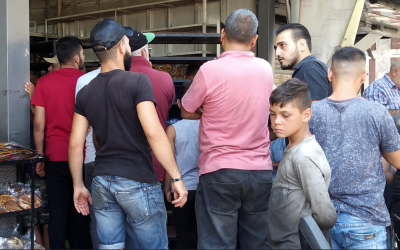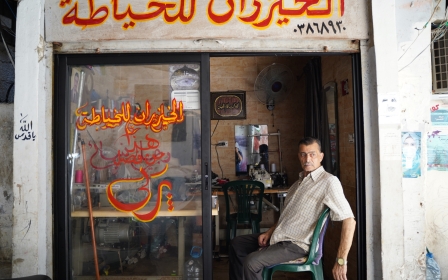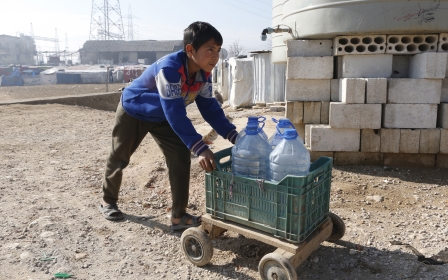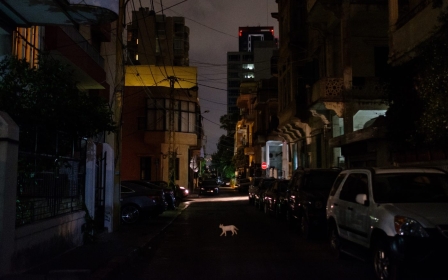Lebanon: Drugs cheaper than food for Palestinian refugees
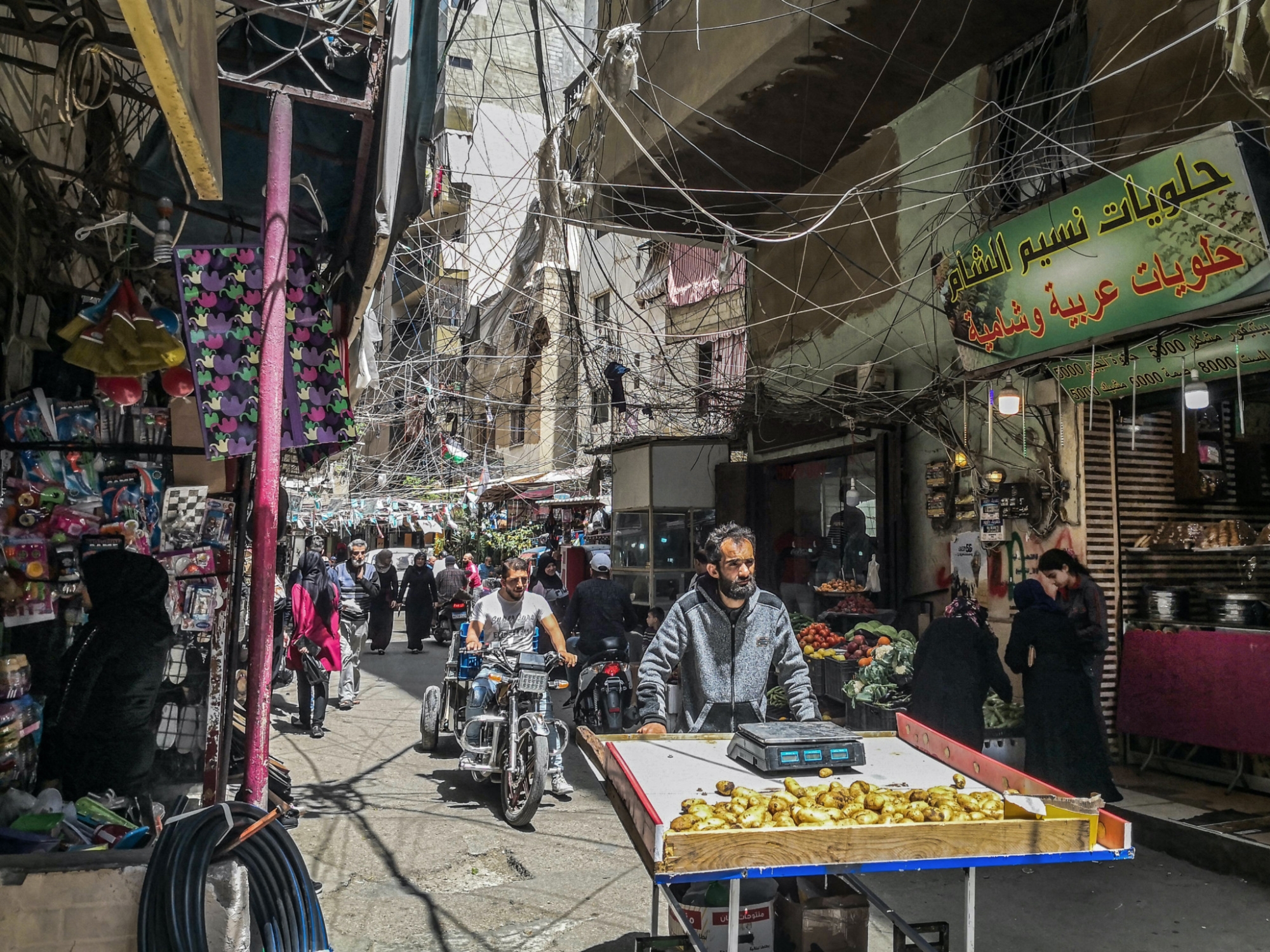
Mohammed stands on the rubbish-strewn kerb running down the main street of Beddawi refugee camp, which lies on a hill north of Tripoli, Lebanon’s second city.
“There is no work, no money, no fuel, little food,” the 24-year-old, who only offered his first name, says. “But the biggest problem here is drugs.”
'When there are no jobs, there is no life. So, the people have drugs.'
- Louay Eid, refugee
Around 30,000 refugees, mainly Palestinians, live crammed into a single square kilometre. Crumbling houses fight for space, pressed so close together that the streets below are always in shadow.
Mohammed’s friend, Louay Eid, waves his hand.
“Look! It’s fine here!” he says, laughing bitterly.
New MEE newsletter: Jerusalem Dispatch
Sign up to get the latest insights and analysis on Israel-Palestine, alongside Turkey Unpacked and other MEE newsletters
“But seriously, when there are no jobs, there is no life.” He pauses.
“So, the people have drugs. It was usually young men,” he adds. “But now it is the older men also, and even children, and women are selling now too.”
Further down the street, one child, sitting with his back against the wall, is staring at the sky with glassy eyes. He isn’t moving, and doesn’t respond to questions. Mohammed points at him, as if to say "There, you see?"
Lebanon has been experiencing an economic crisis since 2019, described by the World Bank as one of the worst in modern times. The Lebanese pound has collapsed, leading to hyperinflation and causing the value of wages, pensions and savings to evaporate. At least 75 percent of the population are living in poverty.
The crisis has had a devastating impact on living standards across the country. There are crippling shortages of fuel, meaning that most homes are only getting two hours or so of state electricity a day, at best. Those who can afford it have extra power supplied by private generators; but these are becoming prohibitively expensive to run as fuel gets ever more scarce.
Captagon is the counterfeited brand name stamped onto a variety of amphetamines that are flooding the camps, and the region. Incredibly cheap to make, it causes a massive energy boost and a rush of euphoria. Experts say that the problem grew worse when Syrians with knowledge of production techniques, and no other alternatives, began arriving in Lebanon after the war erupted in Syria in 2011.
Ahmed Hassan runs a small pharmacy on Beddawi camp's main thoroughfare. Its shelves are threadbare.
“There’s no work for youth,” he says. “There’s no medicine, and food is getting very expensive.”
But despite a desperate living situation, and growing fears for what the winter will bring, he, like others, cites amphetamine as the main concern.
“A pill here costs 7,000 LBP,” he claims - almost the same price as a can of Pepsi. That’s equivalent to roughly $0.35, according to the black market exchange rate, which is hovering around 20,000 pounds to the dollar. “It’s cheaper than some food,” he says.
No rehab centres
Lebanon has hosted a large Palestinian population for over 70 years. In Beddawi, people whose families have lived in the area for generations will say they are from Haifa, or Jaffa, or Nazareth, descendants of refugees who were expelled by Zionist militias from their villages and towns in 1948 during an event known to Palestinians as the Nakba, or "catastrophe".
According to UNRWA, the UN body working with Palestine refugees across the region, there are more than 479,000 registered Palestinians in Lebanon - although recent surveys put the actual figure at closer to 250,000, as many have fled the country.
Their situation has always been precarious. There are limits on Palestinian rights to work, and a lack of formal citizenship makes accessing healthcare, or travel, difficult. Camps have long suffered from serious overcrowding, high poverty rates, and violence. All of this has been exacerbated by the current crisis.
Ahlam Chalabi is the area manager for Anera, an NGO working with vulnerable communities in Lebanon and Palestine. Sitting in her Tripoli office, she feels that the situation facing Palestinians, as well as the Syrian community and local people, is overwhelming.
“We don’t know what will happen tomorrow,” she says. “There are not enough resources for all those living in these camps, in a very hard social and economic situation.”
Drugs have become a crutch for many living in these circumstances. But, she says, there is nobody working on the issue, no rehab centres for addicts to go to.
Lebanese security forces keep a watchful eye over camps – in some instances, they guard the perimeter – but they don’t enter. The camps’ internal security is managed by armed factions. “We are all equal now,” she says, acknowledging the fact that severe poverty is now affecting the vast majority of people in northern Lebanon, whatever their background.
In Beddawi, the walls are adorned with the flags and logos of Palestinian groups like Hamas, Fatah, and others. On almost every surface there are illustrations and photographs of occupied Jerusalem’s al-Aqsa Mosque, a symbol representing both a lost homeland and the promise of return. Tattered images of fighters swathed in keffiyehs also peel off of surfaces.
“The martyrs who died fighting Israel,” explains Mohammed, pointing.
But several people claim that drugs are causing an increase in clashes within the camp itself.
In her office at the Beddawi women’s centre, which was established in partnership with Anera, Wala, using only her first name, says that “Last week, a brother killed his brother. It was an accident – they were both on drugs.”
Middle East Eye was unable to independently verify the incident.
'Like treason'
“I’m just a charity activist,” says Jamal Yafoui, who lives in Nahr el-Bared camp, located 16km from Tripoli.
He first noticed there was a problem when a friend became addicted to “illegal drugs”. He decided to help – and succeeded.
“[Taking him] from doctor to doctor,” he says, “I tried to help him stand up to get rid of it… removing the obstacles and worries because of which he was addicted.”
Nahr el-Bared was partially destroyed when major clashes broke out between the Lebanese army and the Fatah al-Islam group in 2007, but reconstruction has failed to stem the chronic overcrowding and poverty that affect camps across the country.
Despite a lack of structural support, Jamal’s experience with his friend inspired him to start helping other addicts.
“We had the idea of helping and working with friends to fight this deadly scourge and treat patients,” he says.
'The government is not doing anything; they are not providing solutions. It’s like treason'
- Ahlam Chalabi, Arena NGO
“I call them patients, not criminals. Many of them ask us for help to get rid of addiction.”
But despite what he says is a growing problem – something on which everyone MEE spoke to agrees – his work is stymied by a lack of help or organisation.
“We are not an official body,” Jamal explains. “We do not have sufficient capabilities to improve, develop and work on our project.”
Illegal drugs are just one problem among the many affecting Lebanon’s most vulnerable. But support for addicts, or for those trying to help them, is not forthcoming, and there is no political solution to Lebanon’s multiple crises in sight.
“The government is not doing anything; they are not providing solutions,” says Chalabi, as she faces an uncertain winter.
“It’s like treason.”
This article is available in French on Middle East Eye French edition.
Middle East Eye delivers independent and unrivalled coverage and analysis of the Middle East, North Africa and beyond. To learn more about republishing this content and the associated fees, please fill out this form. More about MEE can be found here.


